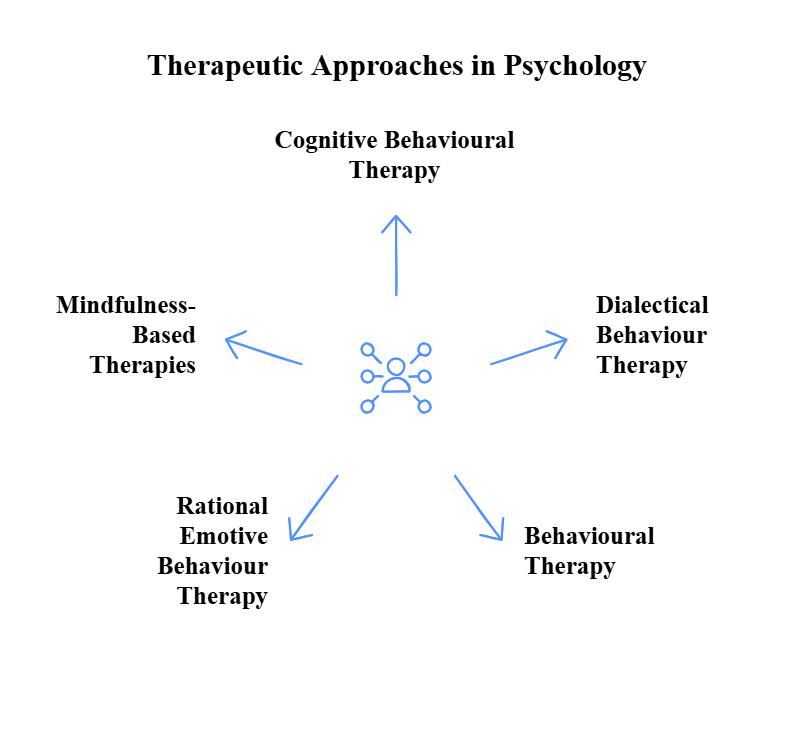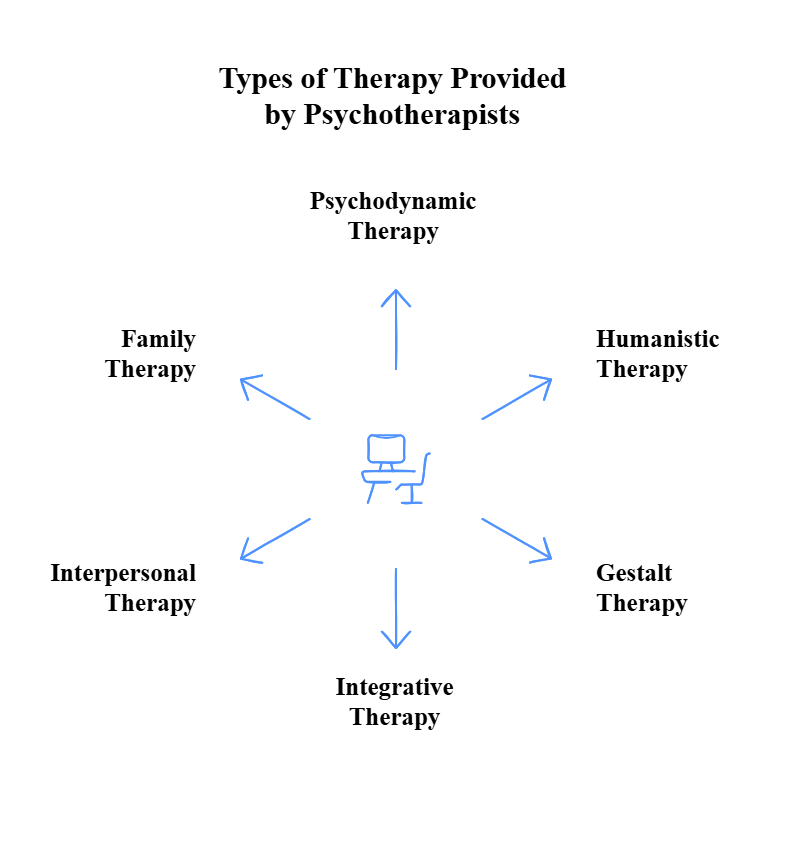
Psychotherapist vs Psychologist: Key Differences to Know

❝Struggling to choose between a psychotherapist vs psychologist? This blog explains the difference clearly; read now to find the right help for your needs.❞
As mental health awareness grows across India, more people are seeking help, but many are unsure where to start. One of the biggest sources of confusion? Psychotherapist vs psychologist- two terms often used interchangeably, but with important differences.
Unsure who can truly help you heal and grow? Understand the key differences between a psychotherapist vs psychologist in India and choose the right support for your mental health journey. Read on to make an informed, confident decision.
Therapy should be personal. Our therapists are qualified, independent, and free to answer to you – no scripts, algorithms, or company policies.
Find Your TherapistTable of Contents | Jump Ahead
- Thinking About Seeing a Psychologist? Here’s What to Know
- Types of Therapy Provided by Psychologists
- When Should You See a Psychologist?
- Thinking About Seeing a Psychotherapist? Here’s What to Know
- Types of Therapy Provided by Psychotherapists
- When Should You See a Psychotherapist?
- What is the Difference Between Psychologist and Psychotherapist?
- How to Choose the Right Professional for Your Needs?
- Find the Right Support with Confidence on TherapyRoute
- Final Thoughts
- Frequently Asked Questions
Thinking About Seeing a Psychologist? Here’s What to Know

A psychologist is a trained mental health professional who studies human behaviour, emotions, and mental processes. In India, psychologists usually hold a Bachelor’s degree in Psychology, followed by a Master’s degree in Clinical or Counselling Psychology. Those who go on to practice clinical psychology may also pursue an M.Phil or PhD and must register with the Rehabilitation Council of India (RCI).
Psychologists are trained to assess, diagnose, and treat various psychological disorders using evidence-based therapies.
Types of Therapy Provided by Psychologists

Psychologists in India are trained in a variety of evidence-based therapeutic approaches designed to address emotional, behavioural, and psychological concerns. These approaches are often structured, goal-oriented, and grounded in scientific research. Depending on the individual’s needs and the psychologist’s area of expertise, one or more of the following therapies may be used:
1. Cognitive Behavioural Therapy (CBT)
This therapy is often recommended for people struggling with anxiety, depression, and unhelpful thought patterns. CBT focuses on identifying and challenging unhelpful thought patterns and behaviours, and replacing them with more balanced, realistic ones. CBT is especially effective for conditions like depression, anxiety disorders, phobias, OCD, and post-traumatic stress disorder (PTSD).
Sessions are typically structured, time-bound, and goal-driven.
2. Dialectical Behaviour Therapy (DBT)
This is typically used when someone experiences intense emotions, self-harm urges, or difficulty managing relationships. A specialised form of CBT, DBT combines cognitive techniques with mindfulness, emotional regulation, and interpersonal skills. It’s particularly helpful for borderline personality disorder (BPD), chronic self-harm, or emotional dysregulation.
Though not yet as widespread in India, trained psychologists in urban centres increasingly offer DBT-based interventions. With the growth of telehealth services and a rising number of trained professionals in Tier 2 cities, access to DBT is gradually expanding beyond major metropolitan areas.
3. Behavioural Therapy
This approach is helpful for changing specific unwanted behaviours, especially in children or those with anxiety and phobias. Behavioural therapy is based on the idea that behaviours are learned and can be unlearned or modified. It uses techniques like exposure therapy, positive reinforcement, and systematic desensitisation. It’s often used to treat phobias, OCD, and developmental issues such as autism.
4. Rational Emotive Behaviour Therapy (REBT)
This therapy suits individuals who struggle with anger, self-doubt, or anxiety linked to rigid or irrational beliefs. REBT helps you identify and challenge irrational thoughts that cause emotional distress. It encourages more flexible, realistic thinking patterns. REBT is commonly used for issues like low self-esteem, performance anxiety, and emotional outbursts, and is often combined with other techniques for a rounded approach.
5. Mindfulness-Based Therapies
These therapies are ideal if you’re feeling overwhelmed, stressed, or emotionally disconnected. Mindfulness-based approaches like MBCT (Mindfulness-Based Cognitive Therapy) and MBSR (Mindfulness-Based Stress Reduction) focus on being present in the moment without judgment. They are particularly useful for managing chronic stress, anxiety, depression, and even physical pain.
These are increasingly popular in urban wellness centres and private practices.
Psychological Assessments Conducted by Psychologists
In addition to therapy, psychologists are trained to carry out standardised psychological assessments. These tools help diagnose mental health conditions, learning difficulties, or developmental concerns, and are often used in clinical, educational, or workplace settings.
Common types of assessments include:
- IQ Testing: Measures intellectual ability and cognitive functioning, often used for academic planning or disability evaluations.
- Personality Assessments: Helps understand behavioural traits, emotional patterns, and coping styles; useful in therapy planning or self-exploration.
- Neuropsychological Evaluations: Assesses brain function and cognitive skills after injury, illness, or in cases of suspected neurological disorders.
- Developmental Screenings: Identifies developmental delays or concerns in young children, including speech, motor skills, and social behaviour.
- Academic and Learning Disability Assessments: Evaluates challenges in reading, writing, or math to diagnose conditions like ADHD or Specific Learning Disabilities (SLD).
Still unsure who to talk to? Here’s how to find the right therapist for you, or visit TherapyRoute to connect with trusted mental health professionals across India.
When Should You See a Psychologist?
You might consider seeing a psychologist in India if you're facing emotional, behavioral, or thinking patterns that feel overwhelming or persistent, and could benefit from structured, evidence-based care. Psychologists are trained to assess and treat a wide range of mental health concerns using proven therapeutic methods.
You might find it helpful to consult a psychologist if you are facing any of the following challenges:
- Depression, anxiety, bipolar disorder, OCD, PTSD, or other psychiatric conditions: You’re experiencing symptoms that need a formal diagnosis and professional care.
- Emotional distress that impacts your daily functioning: Your feelings are interfering with your work, relationships, or ability to carry out everyday tasks.
- Recurring negative thoughts or emotional difficulties:
You struggle with panic attacks, low motivation, or managing your emotions effectively. - Need for psychological assessments:
You require testing for ADHD, autism spectrum disorder, learning disabilities, or personality disorders, often for education, work, or medical reasons. - Desire for goal-oriented therapy: You prefer evidence-based treatments like cognitive behavioral therapy (CBT) or rational emotive behavior therapy (REBT) to work through your challenges.
- Coping with grief, trauma, or major life changes:
You need professional support to navigate loss, trauma, or significant adjustments in your life. - Seeking advice on psychiatric medication:
You want guidance, a second opinion, or help coordinating treatment with a psychiatrist.
Looking for a qualified psychologist in India? TherapyRoute connects you with trusted, experienced psychologists who truly listen and understand your needs. Visit us now to find the right support for your mental health journey.
Thinking About Seeing a Psychotherapist? Here’s What to Know

A psychotherapist is someone trained to support you through talk therapy, helping you work through emotional struggles, life transitions, or inner conflicts. In India, the title isn’t legally regulated, so psychotherapists may come from different professional backgrounds such as psychology, counselling, psychiatry, or social work.
While not all psychotherapists are psychologists, many psychologists also practise psychotherapy. The key difference is that psychotherapy refers to the method, whereas psychologist refers to the qualification.
Also Read: Psychotherapy vs Counseling: Which One’s for You?
Types of Therapy Provided by Psychotherapists

Psychotherapists in India come from diverse professional backgrounds, including clinical psychology, counselling, psychiatry, and social work. They are trained in various talk therapy modalities aimed at improving emotional well-being, interpersonal relationships, and personal growth. Unlike psychologists, they may not conduct formal psychological assessments but are highly skilled in long-term, insight-oriented therapy.
Some common types of therapy offered by psychotherapists in India include:
1. Psychodynamic Therapy
This approach explores unconscious patterns, early life experiences, and emotional conflicts that influence present behaviour. It is commonly used for long-term issues such as relationship problems, chronic low self-esteem, and unresolved trauma.
2. Humanistic or Person-Centred Therapy
This therapy focuses on personal growth and self-acceptance. The therapist provides a safe, non-judgemental space where the client can explore their feelings and values to build self-awareness and emotional resilience.
3. Gestalt Therapy
Gestalt therapy helps individuals gain awareness of the present moment and take responsibility for their experiences. It is often used for people dealing with unresolved emotional issues, identity confusion, or blocked creativity.
4. Integrative or Eclectic Therapy
Many psychotherapists in India use a combination of techniques from different approaches to tailor the therapy to the client’s unique needs. This may include elements of CBT, mindfulness, narrative therapy, or interpersonal therapy.
5. Interpersonal Therapy (IPT)
IPT focuses on improving communication skills and resolving conflicts in current relationships. It is often used for people facing grief, social isolation, or adjustment difficulties.
6. Family Therapy
This approach involves working with families as a unit to address patterns of interaction, conflicts, or issues related to parenting, communication, or mental health challenges within the family. It is often used when a child, adolescent, or even an adult is affected by a family dynamic that contributes to distress.
When Should You See a Psychotherapist?
If you’ve been feeling emotionally drained, stuck in old patterns, or struggling in relationships, you’re not alone. These challenges can be hard to navigate on your own. You might consider seeing a psychotherapist in India if you’re dealing with emotional concerns, life changes, or a desire for personal growth that don’t require a formal diagnosis.
A psychotherapist offers a safe, supportive space to help you explore your thoughts, process your feelings, and move toward lasting change. Here are some common situations where seeing a psychotherapist may be beneficial:
- Persistent emotional struggles:
You experience sadness, loneliness, guilt, or emotional numbness that doesn’t seem to go away. - Relationship difficulties:
You’re facing recurring conflicts, poor communication, or emotional dependence in close relationships. - Unresolved past experiences:
Issues from childhood or painful past events continue to affect how you think, feel, or behave. - Major life transitions:
You’re dealing with grief, a breakup, identity concerns, or big life changes and need support processing them. - Desire for personal growth:
You want to develop greater self-awareness, build emotional resilience, or improve how you manage feelings. - Feeling stuck or lost:
You notice yourself repeating unhealthy patterns and want to understand what’s holding you back. - Chronic stress or burnout:
You’re overwhelmed by daily demands, questioning your sense of purpose, or need a safe space to reflect.
Struggling to find someone who truly understands what you're going through? TherapyRoute connects you with trusted, experienced psychotherapists who offer compassionate, personalized support.
Take the first step toward healing by finding the right therapist for you today!
What is the Difference Between Psychologist and Psychotherapist?
While both psychologists and psychotherapists help people overcome mental health issues, they are not the same.
The table below shows the key differences:
| Aspect | Psychologist | Psychotherapist |
|---|---|---|
| Education | Doctoral degree or a master’s degree in clinical psychology | Master’s degree and special training |
| Treatment Approach | Focus on formal assessment and evidence-based methods | Emphasis on talk therapy and emotional healing |
| Licensing | State licensure required | May practice without strict licensing |
| Diagnosis | Can diagnose mental health disorders | Typically does not provide formal diagnoses |
| Specialisation | Complex mental illness | Relationship and emotional challenges |
Knowing the differences between psychologists and psychotherapists can make it easier to find support that feels right for your unique situation. This understanding can help you take a confident step toward better mental health and well-being.
Disclaimer: Education and training for psychologists can vary by country. In regions like India and South Africa, a Master's degree is typically required for clinical practice. Always consult local guidelines for specific qualifications.
Also Read: Therapist vs Psychologist - What's the Difference?
How to Choose the Right Professional for Your Needs?

Confused about whether to see a psychologist or a psychotherapist? You’re not alone. If you're seeking help for the first time, it can be hard to know who to turn to. Both professionals offer support, but they differ in training and approach. Understanding these differences can help you choose the right kind of help for your needs.
How to Know Who’s Right for You? Key Factors to Consider
Here are some key aspects to evaluate before making your choice:
1. Nature of concern
If you are dealing with clinical mental health problems such as depression, obsessive-compulsive disorder (OCD), bipolar disorder, or attention deficit hyperactivity disorder (ADHD), a psychologist, particularly one with clinical training, may be more appropriate. For relational issues, emotional distress, or personal development, a psychotherapist may be a better fit.
2. Need for diagnosis
If you require formal psychological testing, diagnosis, or documentation for academic, legal, or occupational purposes, consult a clinical psychologist registered with the Rehabilitation Council of India (RCI).
3. Preferred therapy approach
If you are looking for short-term, structured, and goal-oriented therapy such as Cognitive Behavioural Therapy (CBT), a psychologist or psychotherapist trained in CBT may be suitable. For deeper, long-term exploration through psychodynamic or person-centred approaches, consider a psychotherapist.
4. Qualifications and accreditation
In India, clinical psychologists must be registered with the RCI to practise legally. Other mental health professionals, including psychotherapists and counselling psychologists, should hold recognised degrees in psychology or mental health and ideally have undergone supervised training. Always verify credentials before beginning therapy.
5. Comfort and rapport
Therapy is most effective when there is trust and mutual understanding. It is acceptable to consult more than one professional to see who you connect with best. A strong therapeutic alliance can significantly impact the success of your treatment.
Want to make your sessions even more effective?
Here’s how to get more out of therapy.
Find the Right Support with Confidence on TherapyRoute
Taking the first step toward mental wellness takes courage, and you’ve already made progress by seeking clarity. Whether you're navigating emotional struggles or simply looking for someone to talk to, the right help is closer than you think.
TherapyRoute is trusted by thousands across India to connect with RCI-verified psychologists, experienced psychotherapists, and licensed counsellors. With a wide network of professionals offering both in-person and secure online therapy, you can access the care you need, wherever you are, and whenever you're ready.
Take the next step toward healing, find your ideal therapist on TherapyRoute today!
Final Thoughts
Understanding the difference between a psychologist and a psychotherapist is key to starting your mental health journey with confidence. While both offer valuable support, their qualifications, focus areas, and approaches differ. If you need a clinical diagnosis or structured, evidence-based therapy, a psychologist may be the right choice. If you're looking for emotional healing, deeper self-exploration, or support through life’s challenges, a psychotherapist could be a better fit. Ultimately, the best decision is one that aligns with your needs, goals, and comfort level. Whichever path you choose, seeking help is a powerful first step, and you don’t have to take it alone.
Also Read: Therapy vs Counselling: Understanding the Key Differences
Frequently Asked Questions
Do I need a referral to see a psychologist or psychotherapist in India?
No, you do not need a referral to consult a psychologist or psychotherapist in India. You can directly reach out to a qualified mental health professional based on your specific concerns or goals. Most practitioners accept self-referred clients, making it easier to access timely support.
Can psychologists and psychotherapists prescribe medication?
No, psychologists and psychotherapists are not medical doctors and therefore cannot prescribe medication. If medication is required as part of your treatment plan, you will need to consult a psychiatrist, a medical professional who specialises in mental health and can provide prescriptions. However, therapy can be used alongside psychiatric treatment for holistic care.
Is a psychotherapist a type of psychologist?
Not always. Some psychologists are trained as psychotherapists, but not all psychotherapists are psychologists. Psychologists typically hold advanced degrees in psychology and offer assessments, diagnoses, and therapy. Psychotherapists may come from various fields like counselling or social work and focus mainly on talk therapy.
Who is more qualified, a psychotherapist or a psychologist?
Psychologists typically hold a doctoral or master’s degree in psychology and may be trained in clinical assessment, diagnosis, and research. Psychotherapists can come from various academic backgrounds, such as psychology, counselling, psychiatry or a clinical social worker, and are trained in providing talk therapy. The level of qualification depends on the individual's education, specialisation, and professional experience.
Should I see a Psychologist or Psychotherapist?
It depends on your needs when choosing between psychotherapy vs psychology. For formal diagnosis or structured therapy for conditions like anxiety, depression, or ADHD, a psychologist is usually more suitable. For long-term emotional support, relationship counselling, or personal growth, a psychotherapist may be the better choice. Knowing the difference between psychology and psychotherapy helps you find the right fit for your goals and comfort.
Explore More on This Topic:
Psychoanalyst vs Psychologist: Key Differences Explained
In-Person or Online Therapy - Which one is the right one for me?
Important: TherapyRoute does not provide medical advice. All content is for informational purposes and cannot replace consulting a healthcare professional. If you face an emergency, please contact a local emergency service. For immediate emotional support, consider contacting a local helpline.
Creating Space for Growth: How Boundaries Strengthen Relationships
Setting boundaries in relationships is one of the most important yet often overlooked aspects of maintaining healthy connections with others. Boundaries are personal limi...
International Mutual Recognition Agreements for Mental Health Professionals
Table of Contents | Jump Ahead Executive Summary Part I: Bilateral Agreements Part II: Multilateral Frameworks Part III: Profession-Specific Frameworks Part IV: Assessmen...
Jumping to Conclusions
Table of Contents Definition Key Characteristics Theoretical Background Clinical Applications Treatment Approaches Research and Evidence Examples and Applications Conclus...
Case Conceptualisation
Table of Contents Definition Key Characteristics Theoretical Background Clinical Applications Conceptualisation Process International Perspectives Research and Evidence P...
Guided Discovery
Table of Contents Definition Key Characteristics Theoretical Background Clinical Applications Treatment Applications Research and Evidence Techniques and Methods Professi...
About The Author
TherapyRoute
Cape Town, South Africa
“Our in-house team, including world-class mental health professionals, publishes high-quality articles to raise awareness, guide your therapeutic journey, and help you find the right therapy and therapists. All articles are reviewed and written by or under the supervision of licensed mental health professionals.”
TherapyRoute is a mental health resource platform connecting individuals with qualified therapists. Our team curates valuable mental health information and provides resources to help you find the right professional support for your needs.

Related Articles

Cognitive Formulation
Cognitive formulation is a core CBT tool that helps therapists map out how a person’s thoughts, behaviours, emotions, and environment interact to maintain their difficult...

Acceptance and Commitment Therapy
Acceptance and Commitment Therapy is a modern intervention with foundations of Behavior Therapy, an underlying focus on Cognitive Processes and also different mindfulness...

Preparation Prior to Your First Psychology Session
It is helpful to prepare for your first session with your new psychologist. Here are some ideas on what to do.